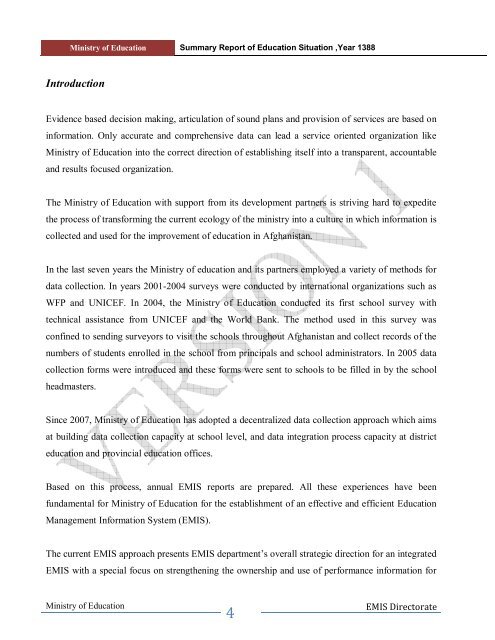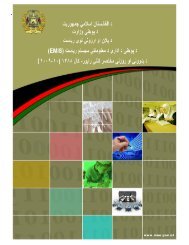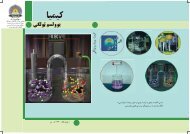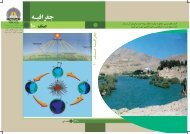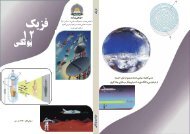Ministry of Education Directorate of EMIS
Ministry of Education Directorate of EMIS
Ministry of Education Directorate of EMIS
You also want an ePaper? Increase the reach of your titles
YUMPU automatically turns print PDFs into web optimized ePapers that Google loves.
<strong>Ministry</strong> <strong>of</strong> <strong>Education</strong> Summary Report <strong>of</strong> <strong>Education</strong> Situation ,Year 1388<br />
Introduction<br />
Evidence based decision making, articulation <strong>of</strong> sound plans and provision <strong>of</strong> services are based on<br />
information. Only accurate and comprehensive data can lead a service oriented organization like<br />
<strong>Ministry</strong> <strong>of</strong> <strong>Education</strong> into the correct direction <strong>of</strong> establishing itself into a transparent, accountable<br />
and results focused organization.<br />
The <strong>Ministry</strong> <strong>of</strong> <strong>Education</strong> with support from its development partners is striving hard to expedite<br />
the process <strong>of</strong> transforming the current ecology <strong>of</strong> the ministry into a culture in which information is<br />
collected and used for the improvement <strong>of</strong> education in Afghanistan.<br />
In the last seven years the <strong>Ministry</strong> <strong>of</strong> education and its partners employed a variety <strong>of</strong> methods for<br />
data collection. In years 2001-2004 surveys were conducted by international organizations such as<br />
WFP and UNICEF. In 2004, the <strong>Ministry</strong> <strong>of</strong> <strong>Education</strong> conducted its first school survey with<br />
technical assistance from UNICEF and the World Bank. The method used in this survey was<br />
confined to sending surveyors to visit the schools throughout Afghanistan and collect records <strong>of</strong> the<br />
numbers <strong>of</strong> students enrolled in the school from principals and school administrators. In 2005 data<br />
collection forms were introduced and these forms were sent to schools to be filled in by the school<br />
headmasters.<br />
Since 2007, <strong>Ministry</strong> <strong>of</strong> <strong>Education</strong> has adopted a decentralized data collection approach which aims<br />
at building data collection capacity at school level, and data integration process capacity at district<br />
education and provincial education <strong>of</strong>fices.<br />
Based on this process, annual <strong>EMIS</strong> reports are prepared. All these experiences have been<br />
fundamental for <strong>Ministry</strong> <strong>of</strong> <strong>Education</strong> for the establishment <strong>of</strong> an effective and efficient <strong>Education</strong><br />
Management Information System (<strong>EMIS</strong>).<br />
The current <strong>EMIS</strong> approach presents <strong>EMIS</strong> department’s overall strategic direction for an integrated<br />
<strong>EMIS</strong> with a special focus on strengthening the ownership and use <strong>of</strong> performance information for<br />
<strong>Ministry</strong> <strong>of</strong> <strong>Education</strong><br />
4<br />
<strong>EMIS</strong> <strong>Directorate</strong>


